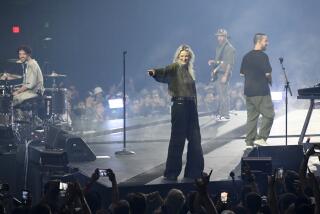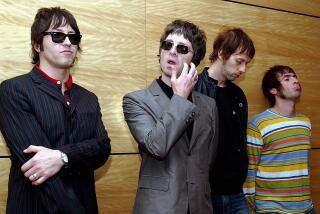How to revive the ‘80s (and how not to) with Paramore and Dreamcar
In the summer of 2009, No Doubt recruited Paramore to be an opening act on its inevitable reunion tour. Given the former’s clear influence on the latter — each with a super-charismatic frontwoman slinging catchy pop hooks over jumpy guitar rock — the booking suggested that the veteran SoCal group was eager to connect with the young fans of a band that helped fill the vacuum No Doubt created when it took a break.
Eight years later, members of both outfits crossed paths again with the release last week of Paramore’s fifth album, “After Laughter,” and the self-titled debut by Dreamcar, a new band that pairs No Doubt’s Tom Dumont, Tony Kanal and Adrian Young with Davey Havok of AFI. (Gwen Stefani, No Doubt’s singer, is concentrating on her solo career.)
But this time nobody would describe Paramore, whose last album earned the group its first Grammy Award, as the junior partner in this relationship. On the iTunes chart this week, “After Laughter” sat at No. 7, amid hit records by Harry Styles and Ed Sheeran, while “Dreamcar” was at No. 75, behind the latest from Todd Rundgren. And Paramore is listed above Dreamcar on the bill for KROQ’s Weenie Roast y Fiesta concert, scheduled for Saturday at the StubHub Center in Carson.
That’s not the only way the two bands appear to have switched roles. After years spent honing reasonably modern pop-punk sounds — one of the few strategies for growth in a slowly dying rock scene — all these musicians are now looking back to the 1980s, openly borrowing the glossy synthesizers and mechanized percussion (not to mention the dubious graphic design) that defined that era.
But where the youthful Paramore finds real energy and emotion in that approach, the old-timers in Dreamcar come off as mere followers — an especially unflattering look given that they actually lived through the period they’re revisiting.
Perhaps that’s Dreamcar’s problem: In gleaming, expertly arranged songs such as “Kill for Candy” and “The Preferred” — the latter of which features a wailing sax solo — these guys get all the ’80s signifiers just right; Kanal plays slap bass like someone who once did it without a trace of self-consciousness. But there’s nothing to this deeply forgettable music beyond its stylistic accuracy, no reason the group seems to have taken up the sound except that it’s popular again and the members know how to re-create it.
With Paramore, on the other hand, you can hear the band’s vital attraction to — and its valuable distance from — its source material. Not that Hayley Williams and her mates are any less concerned with trends than Dreamcar; surely their aesthetic shift was inspired in part by earlier ’80s-inspired efforts by the likes of Haim and the 1975. (Between Paramore albums, the singer has dabbled in the world of Top 40 pop, guesting on singles by rapper B.o.B and EDM star Zedd. So you know she knows what’s up.)
On “After Laughter,” though, the band successfully channels the imagined spirit of the ’80s — the sense of possibility and outsize ambition that propelled monster tunes like Madonna’s “Like a Prayer” and Duran Duran’s “Hungry Like the Wolf.” What’s more, Paramore is using that feeling, which then accompanied pop’s happy embrace of plasticity, to punch up tunes such as “Fake Happy” and “Idle Worship,” about Williams’ dogged search for authenticity.
“Just let me cry a little bit longer / I ain’t gonna smile if I don’t want to,” she sings in the shamelessly sugary “Rose-Colored Boy,” and the tension between lyric and groove is juicier than anything by Dreamcar.
Maybe Paramore is in the market for a warm-up act this summer?
Twitter: @mikaelwood
ALSO
The Backstreet Boys ate a bunch of kids’ lunches at Wango Tango
Harry Styles is a young classic rocker on his dad-baiting solo debut
On the road with Billy Joel: The Piano Man talks Trump, L.A. — and new music?
More to Read
The biggest entertainment stories
Get our big stories about Hollywood, film, television, music, arts, culture and more right in your inbox as soon as they publish.
You may occasionally receive promotional content from the Los Angeles Times.











